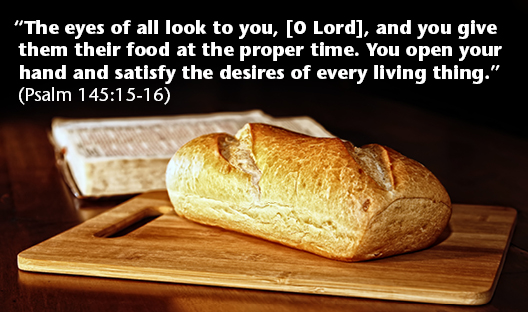
Many Christian homes begin mealtime with the prayer, “The eyes of all look to you, [O Lord], and you give them their food at the proper time. You open your hand and satisfy the desires of every living thing” (Psalm 145:15-16 NIV). This prayer acknowledges that God provides for all of our needs of body and soul. He gives these provisions to all people through means. Children experience this provision in unique ways. They do not work, and yet meals are set before them. They have no money to buy clothes, and yet they are clothed. God provides all that is necessary for their lives through the means of parents, grandparents, and guardians. As we grow older, we tend to forget how God provides for us every day of our lives. We start listening to the devil’s words bidding us to question, “Did God really say … that He would provide us with all that we need? That He will take care of our children?”
Every one of us wants our children to live, grow strong, and thrive. We want them to have life and have it to the full. To this end, we make sure that our children have the best food, education, and health care that we can afford. We do not want our children to fall behind in this technological world that is getting more advanced by the second. We don’t want our children to get any disease, especially anything that may be preventable by proper health care. So we use all the means that God has given us to prepare our children for life by giving them the tools that they will need to be healthy and successful. For many of us, this road to health and success starts immediately after our children are born with the care that they receive in the hospital.
God uses parents and guardians as means by which He provides children with all they need to support their bodies and lives. With this said, parents do have choices in their health care, and some of those choices have to do with the ethics of health care. For instance, many For Life parents are unaware that some vaccines were developed and are made using aborted children. You can visit the following to begin your research on this troubling reality at Children of God For Life and Lutherans For Life.
These articles show us that sometimes humans attempt to redesign God’s law in a desire to protect our own children. We are certainly For Life, but is it okay to use the deaths of the helpless to keep us and our children alive? As a society, has our worry about God’s provision led us into sin? Should we promote an industry where more abortions are needed for further medical study that might protect against an illness? Do we want to promote an atmosphere where the murder of somebody else’s child is justified because it might prevent our children from contracting a disease?
Worry pushes us into places that God would not have us go, but living lives of thanksgiving leads us to use what God freely gives to ensure life for everyone. God’s ultimate purpose is to bring all people from every nation to a place where they hear the Word of Christ which gives eternal life to all who receive it (Acts 17:26-28). For Life individuals have the opportunity to ask vaccine manufacturers to provide ethical options that do not use aborted children in their research and development. We must also show with our medical choices that we are committed to the unborn.
Christians live in a scary world, and we do all that we can to promote life in this culture of death. However, Christians should not break God’s commandments or encourage others to do so, even if it is in the name of medicine (Romans 3:8). We should not make our decisions based on fear (2 Timothy 1:7). Christians make decisions with the knowledge that Jesus’ obedience to the Ten Commandments on our behalf and His death in our place gives us life that no disease can ever take away. We do go to doctors that God provides for our health. But, Christians will not choose to stay alive at the cost of our neighbor’s life. We pray for God’s light to shine on all of our decisions and that every aspect of our lives would be fulfilled within the boundaries of His Law and Gospel. We do not want our worry to guide our search for daily bread (Matthew 6:25-34). Rather, we rely on God’s Promise and receive what He has provided with thanksgiving. For we know that with Jesus we have daily bread that endures, even to everlasting life (John 6:28-29).
Rev. Justin A. Herman is senior pastor of University Lutheran Church in West Lafayette, Indiana, serving the students at Purdue University.